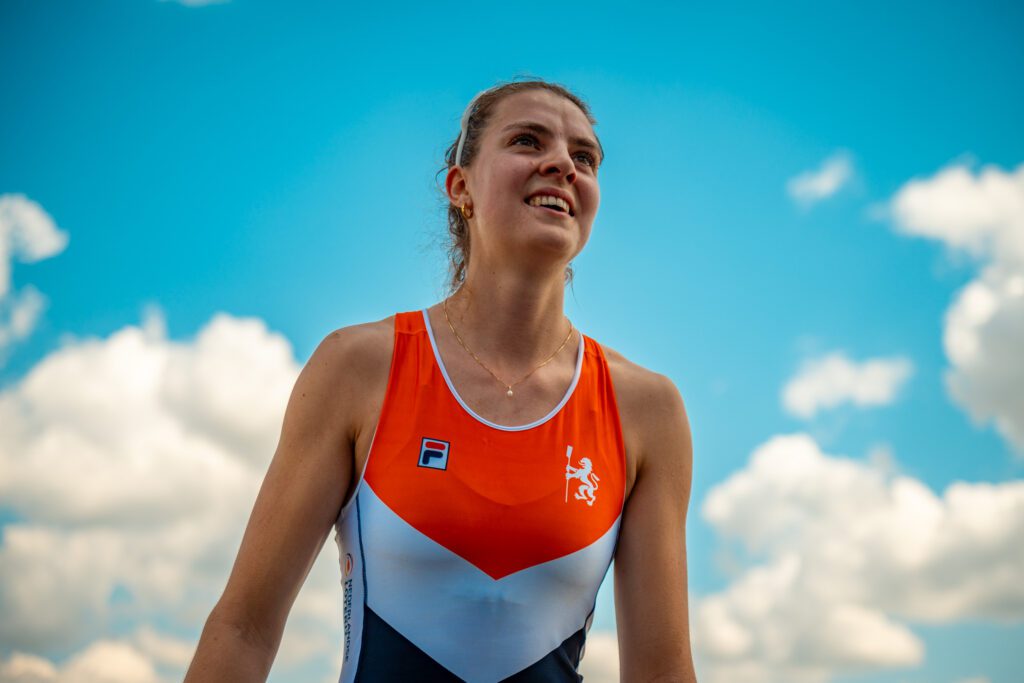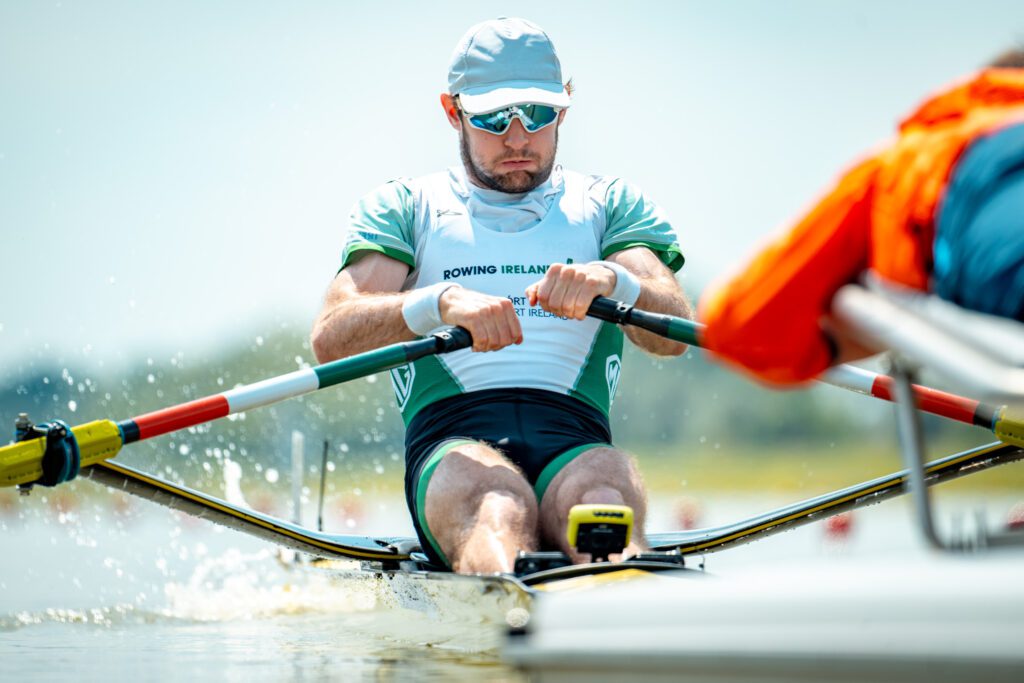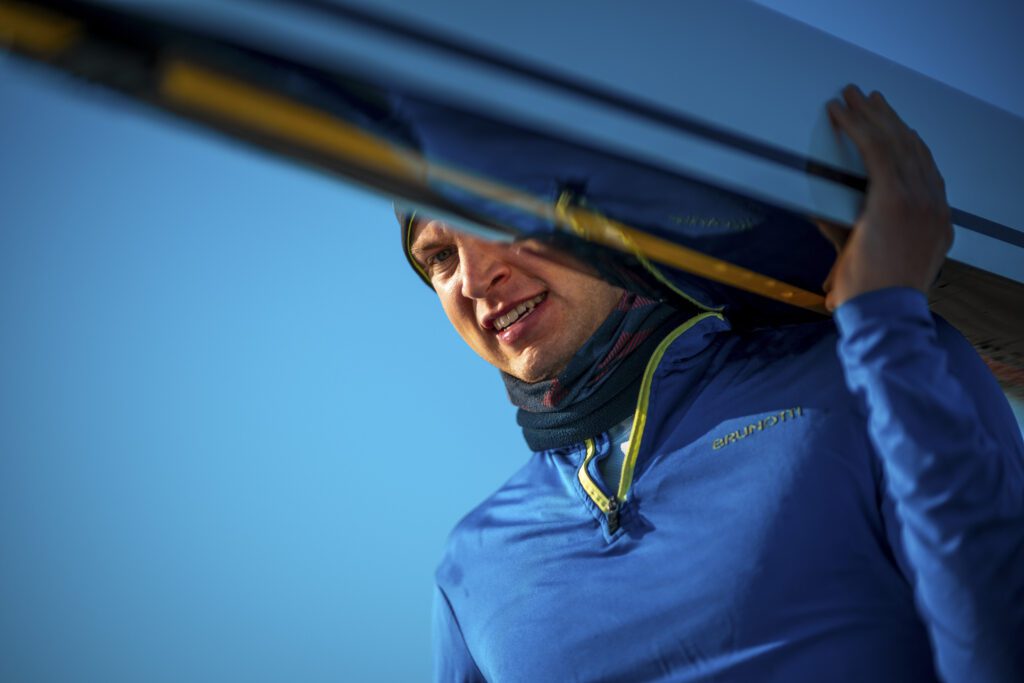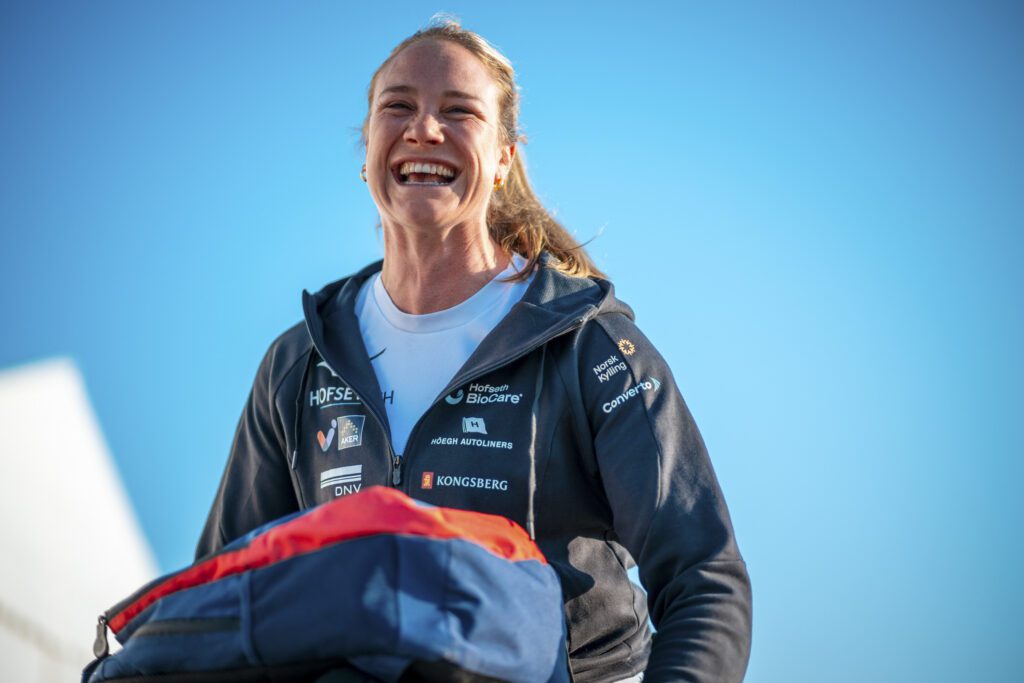Five and a half final hours of furious racing closed the curtains on the 2023 world championships, rowing still in charge before it gave Lake Sava back to its carp, its jellyfish and the local families who enjoy swimming and playing in the Ada Ciganlija recreational park. Before the trailers loaded up and the athletes swapped half their kit, there were a few medals to award and Paris spots to secure.
The top four singles finals of the week were extraordinary in different ways. After a truly abysmal competition in which they’ve qualified only six boats to their two home Games, France were celebrating as Nathalie Benoit replicated her Linz result from 2019 and took silver after destroying Moran Samuel (ISR) and closing hard on successfully defending champion Birgit Skarstein (NOR). Skarstein was in floods of joyful tears speaking to Norwegian TV after one of her closest and hardest races to date.
On paper the men’s para-singles looked dreadfully dull, replicating the 2022 result of gold for Roman Polianskyi (UKR), silver for Giacomo Perini (ITA) and bronze for Ben Pritchard (GBR). But the immense grit of all three athletes, who were alongside one another for the first 500 metres and still battling for every stroke as Polianskyi went clear, was evident. Polianskyi, whose training has been heavily affected by changes forced on the squad by Russian military action, cut three seconds off the world championship best time and promised “If the war will end, I will be the fastest in the world”.
The women’s Olympic singles also copied last year’s result, though not for lack of trying a change. The event which is rapidly turning into the Karolien Florijn show saw the Dutch reigning champion surge out early and hard, but despite all the New Zealand veteran’s guile and cunning, Emma Twigg couldn’t put more than a fingertip on Florijn, and that only early in the race when she and Australia’s Tara Rigney were in strong contention before Florijn floored it in typical style and swept away. Rigney did fall prey to Twigg’s expert pacing, but cleaned up the bronze to deny Kara Kohler after the USA’s big hope had a rotten first quarter.
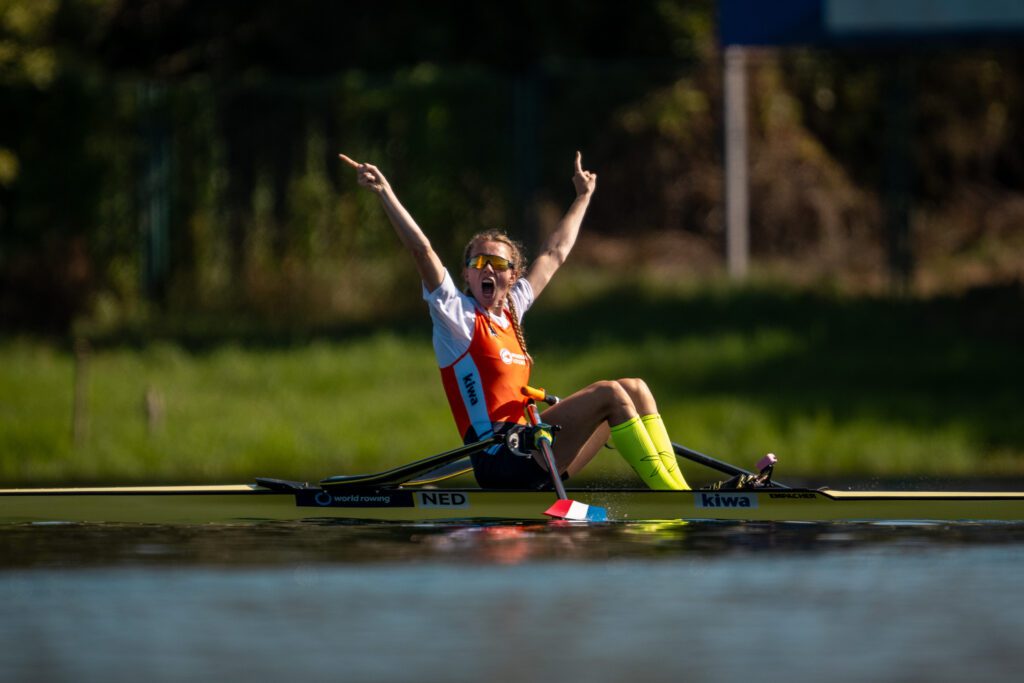
Photo Karolien Florijn wins the women’s single on Sunday in Belgrade
Credit Benedict Tufnell
“The start keeps going further and further out, before everyone settles”, said Rigney. “It makes the middle k pinch so much more. You can’t settle until the first person settles, they’re all looking around going ‘who’s going to do it first?'” Twigg was in a contemplative mood at what may well be her last worlds. “When I think back to the 19-year-old who qualified for her first Olympics [in 2007, so she was actually 20], I wish that she knew just what an achievement that was”, said the Kiwi. “I haven’t been outside the top four since 2009, I’m really proud of that.”
Unlike the women, the men had two new names on the podium, but both had to bow to this year’s man of the Olympiad, Olli Zeidler, who retained his 2022 title with a massive early move at 250m gone, followed by a cruise to the line. At this point enter the joker in the pack, Simon van Dorp, who after Lucerne lost his place in the world-beating Dutch quad (which also features Karolien’s golden brother Finn Florijn), and was forced to have a go at the single due to what might reasonably be called creative differences with the Dutch coaches.
Liberated from the need to fit the mould of a large crew boat, van Dorp took with aplomb to the single and romped through the early stages of the competition to earn himself a slot alongside sculling’s current megastars. He and New Zealander Thomas Mackintosh managed to stay close enough to Zeidler to wreck everyone else’s hopes of being in the top three, and claimed silver and bronze ahead of Olympic champion Stefanos Ntouskos (GRE). Both medallists ended with sufficient breath to give lengthy media interviews while Zeidler was being hosed down with ice water to help him recover long enough to be hoisted on their shoulders at the medal ceremony.
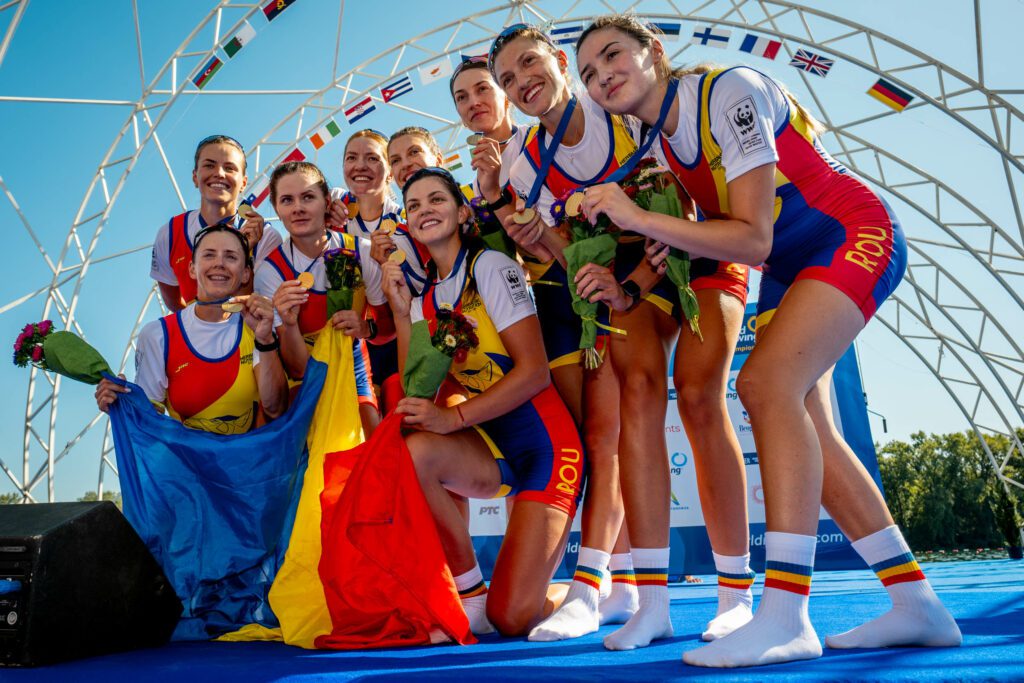
Photo Romania win gold in the W8+
Credit Benedict Tufnell
“It’s honestly been easier to race the single than some of the big boats, because you don’t have a group process”, said van Dorp. “You just need to know yourself, know what you need.” “What an incredible race to be part of”, said Mackintosh. “Stefanos was coming up very hot on the tail so to come up with a medal is just exhilarating.”
In the other small boats of Sunday’s schedule, the doubles, Dutchmen Melvin Twellaar and Stefan Broenink kept the Sinkovic brothers in their box long enough to bag a gold which put the Netherlands on top of the medal table. Ireland fought Italy and Spain beautifully to take the bronze. Romania reclaimed the women’s title before complaining that they were jealous of their compatriots in the eight, Simona Radis and Ancuta Bodnar promising that now Romania has qualified everything in sight for Paris, they will be joining the eight for the Olympic regatta as well as defending their Tokyo doubles crown.
With Olympic champions Canada not quite sparkling enough, no Dutch women’s eight present and the likes of Britain and Italy struggling to hold top pace alongside the leaders, it was Romania making all the running in the women’s eights. They sailed down the course in lordly style, shedding Australia and fending off everything the USA could throw at them. For a while Australia felt the silver in their hands before an epic attack by the USA carved through them, but the Americans could not quite reach the reigning champions. “That was definitely different, I don’t think we’ve been in last place going into the second 500”, said US cox Nina Castagna. “We talked every day about our trust in each other, in the plan and executing it. So I knew that as we made our way through the race all we had to do is trust that it was going to work out.”
To make up for the women’s bronze Australia’s men’s eight did their damnedest to spring a shock on European champions Great Britain. They made a good fist of it, forcing GBR to go out hard and fast to hold onto them. But the Brits have learned a thing or two since being taken to the cleaners by the Aussies in Lucerne this July. They rode out the worst Australia could throw at them and sat firmly on their rhythm, eventually moving away to a clear length before the field closed back in slightly. Behind the leaders the Netherlands claimed their third silver and closed hard in the last 200 metres, while Australia kept the slower eights at bay to add another bronze to their tally.
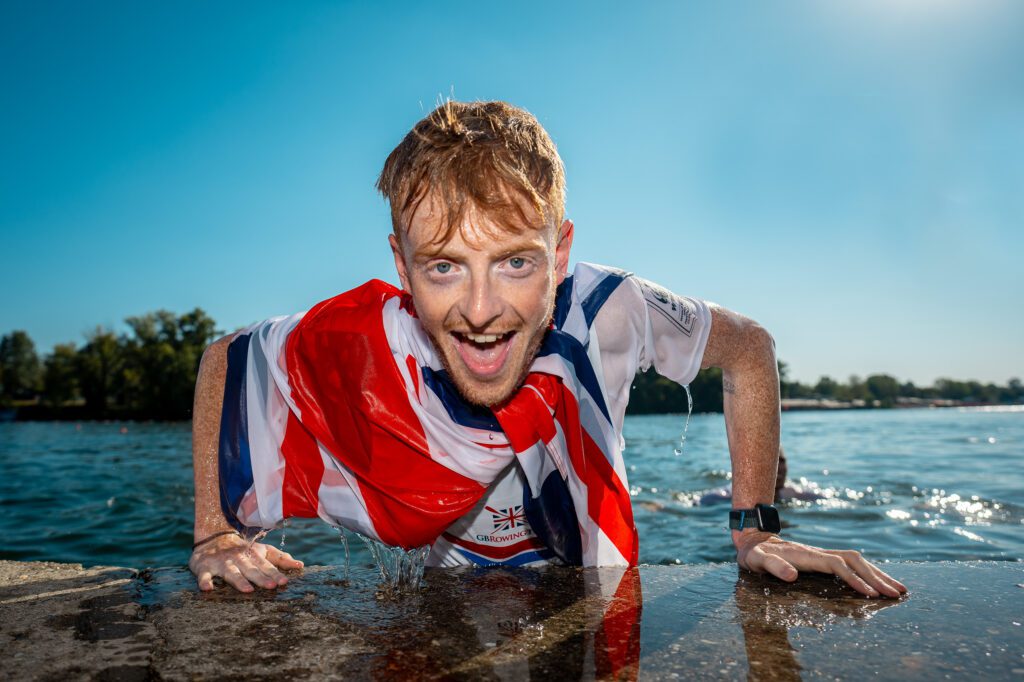
Photo Harry Brightmore, cox of the GBR M8+, goes for a swim after winning gold.
Credit Benedict Tufnell
“We were totally ready for that to be really close to the first two markers and it was”, said GBR cox Harry Brightmore. “We just knew that if we got [there] in relatively good shape, we could twist the knife. Once we felt a bit of momentum, we sniffed a bit of blood, and as soon as we sensed that, every inch, we took another seat. I think that was very brave of the guys to take it on early. You’ve got to take a risk, the field is stepping on, and someone’s got to take a risk, we’ve got to keep making sure it’s us.”
In the past the minor finals could tend towards dreary, rowed past empty grandstands and half-asleep commentators. No longer. From the three-man PR1 men’s singles D-final through to the eights B-finals it was competitive beyond belief. Individual neutral athlete Yauheni Zalaty won the men’s singles B-final to the huge disappointment of the Serbian spectators after their adopted son Nikolaj Pimenov had led for 1700m then completely tied up after the rest of the field burned their way back to him. Behind Zalaty Ryuto Arakawa (JPN) and Dovydas Nemeravicius (LTU) got very lucky indeed when Kristian Vasilev (BUL) caught a crab in the closing strokes, and let them past into the other two qualifying spots.
An exhausted Arakawa fell in just after the finish line and wasn’t the only one, Uzbekistan’s Egamberdiev Kholmurod doing the same a race later after claiming his country’s first Games place by winning the PR1 M1x final. Thoughts of Linz, where a Belarussian para-sculler drowned just before the 2019 worlds after capsizing while training on the course, were banished by an ultra-swift response from the safety launch, which had Kholmurod out of the water in thirty seconds flat.
A side note that Zalaty’s “Paris place” goes on hold, and won’t be awarded to him at this stage since neutral athletes are not national Olympic committees or federations so cannot earn qualifying places at the worlds. Whether it goes to his real nation (should peace break out in Eastern Europe before next summer) or is awarded to someone else, perhaps Vasilev as the highest-ranked non-qualifier, remains to be decided by the IOC and World Rowing during the next ten months. One of the last three women’s singles spots was claimed by Magdalena Lobnig, a redeeming piece of good fortune for Austria after the dreadful death of her team-mate Christoph Seifriedsburger in a cycling accident earlier this year. The other two went to the normally excellent Alexandra Foester and Serbian Jovana Arsic.
And so the rowing park emptied and the sun set over Lake Sava. An eventful, intense, worthy world championships. The stage is set for next summer’s spectaculars in France, but there’s a long way to go before we know the exact cast. It’s going to be a wild ride.
